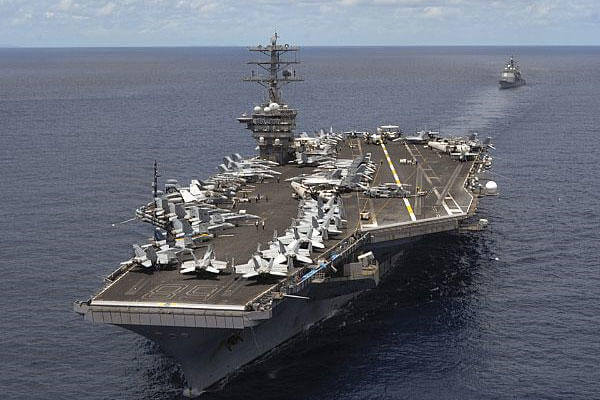The carrier Nimitz and its battle group sailed to the Red Sea Monday in a buildup of naval forces in the region in the event of an attack on Syria, defense officials said Monday.
Military leaders called the repositioning of the Nimitz and its accompanying ships, the cruiser Princeton and the destroyers Shoup, Stockdale, and Lawrence, an effort at "prudent positioning" to guard against developments in the region.
The Nimitz, with 80 warplanes aboard, was relieved on station last week by the carrier Truman in waters near the Persian Gulf. The Nimitz had been scheduled to move east across the Pacific to its homeport in Everett, Wash., before receiving orders for the Red Sea. Reuters first reported the movement of the Nimitz Sunday, and defense officials later confirmed the report.
The whereabouts and mission of the amphibious assault ship Kearsarge and the dock landing ship Carter Hall were less clear. Reports from the region said the ships, with more than 1,000 Marines aboard, were also now in the Red Sea, but defense officials would not confim the reports.
Another ship in the Kearsarge's Amphibious Ready Group, the dock landing ship San Antonio, with about 200 Marines aboard from the 26th Marine Expeditionary Unit, was already off the coast of Syria with five destroyers -- the Ramage, Mahan, Barry, Mahan and Gravely -- carrying hundreds of Tomahawk Land Attack Missiles.
The Navy buildup came as Sens. John McCain, R-Ariz., and Lindsey Graham, R-S.C., who have both called for more robust strikes on Syria, met at the White House with national security officials on the coming vote in Congress on whether to punish Syria's alleged use of chemical weapons.
President Obama had outlined what he called "limited" missiles strikes of short duration on Syrian military sites. However, in a surprise announcement Saturday, Obama said he was holding off on the attacks to seek authorization from Congress.
Congress was not due to return from vacation until Sept. 9, but a series of Congressional hearings on the proposed Syria resolution have been scheduled this week. The first will be a hearing Tuesday of the Senate Foreign Relations Committee at which Secretary of State John Kerry, Defense Secretary Chuck Hagel and Gen. Martin Dempsey, the chairman of the Joint Chiefs of Staff, were expected to testify.
France has been the only U.S. ally to agree to join strikes on Syria. A debate on attacking Syria was scheduled for Wednesday in the French National Assembly, although President Francois Hollande does not need Assembly approval to order a strike.
Over the weekend, senators and representatives from both parties said that Obama faced an uphill battle in winning Congressional approval for action against Syria. They also said that the draft resolution on authorization sent by the White House to Congress on Saturday night would also be subjected to numerous amendments and changes in language.
The current language would authorize Obama to use force "as he determines to be necessary and appropriate" against Syria's use of chemical weapons "to prevent or deter the use or proliferation (including the transfer to terrorist groups or other state or non-state actors) within, to or from Syria of any weapons of mass destruction."
The proposed resolution said that the use of force was also necessary "to protect the United States and its allies and partners against the threat posed by such weapons."






























